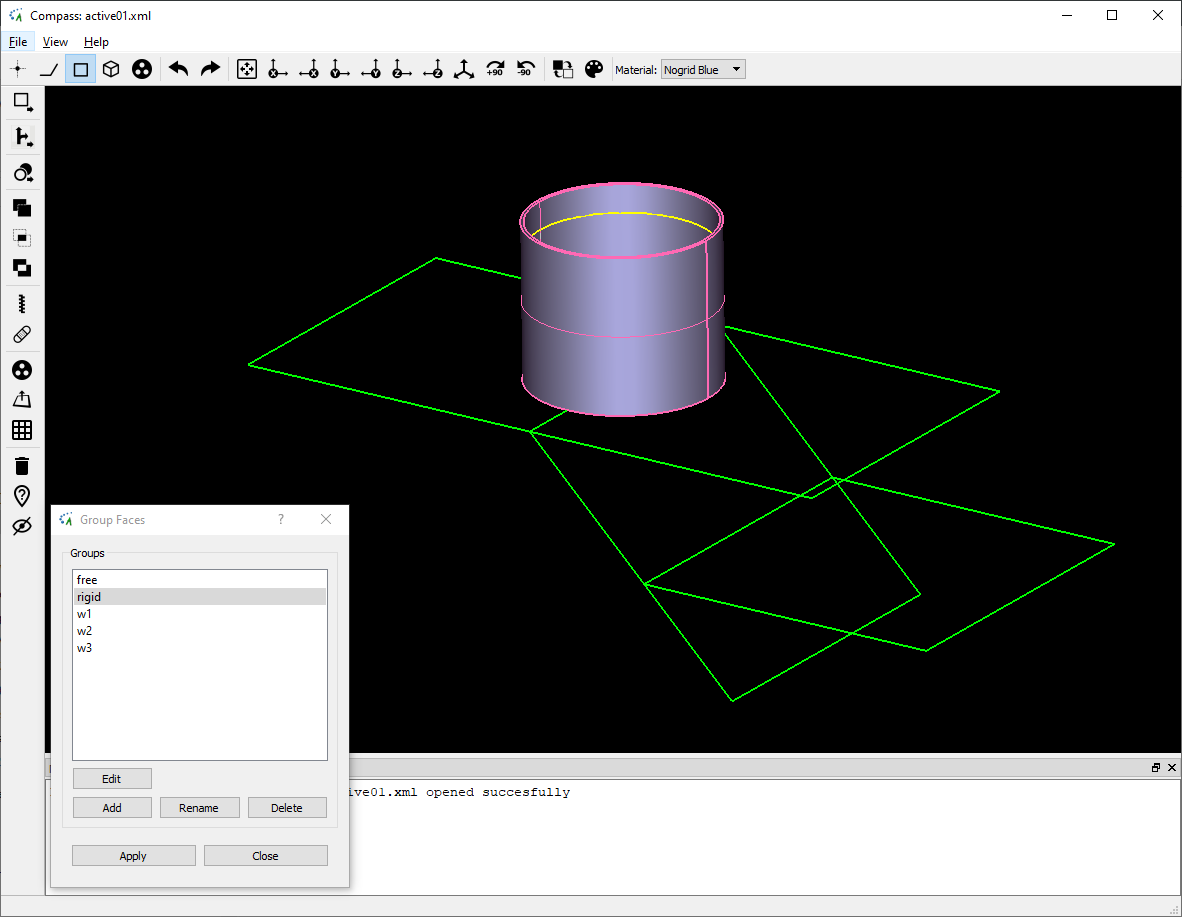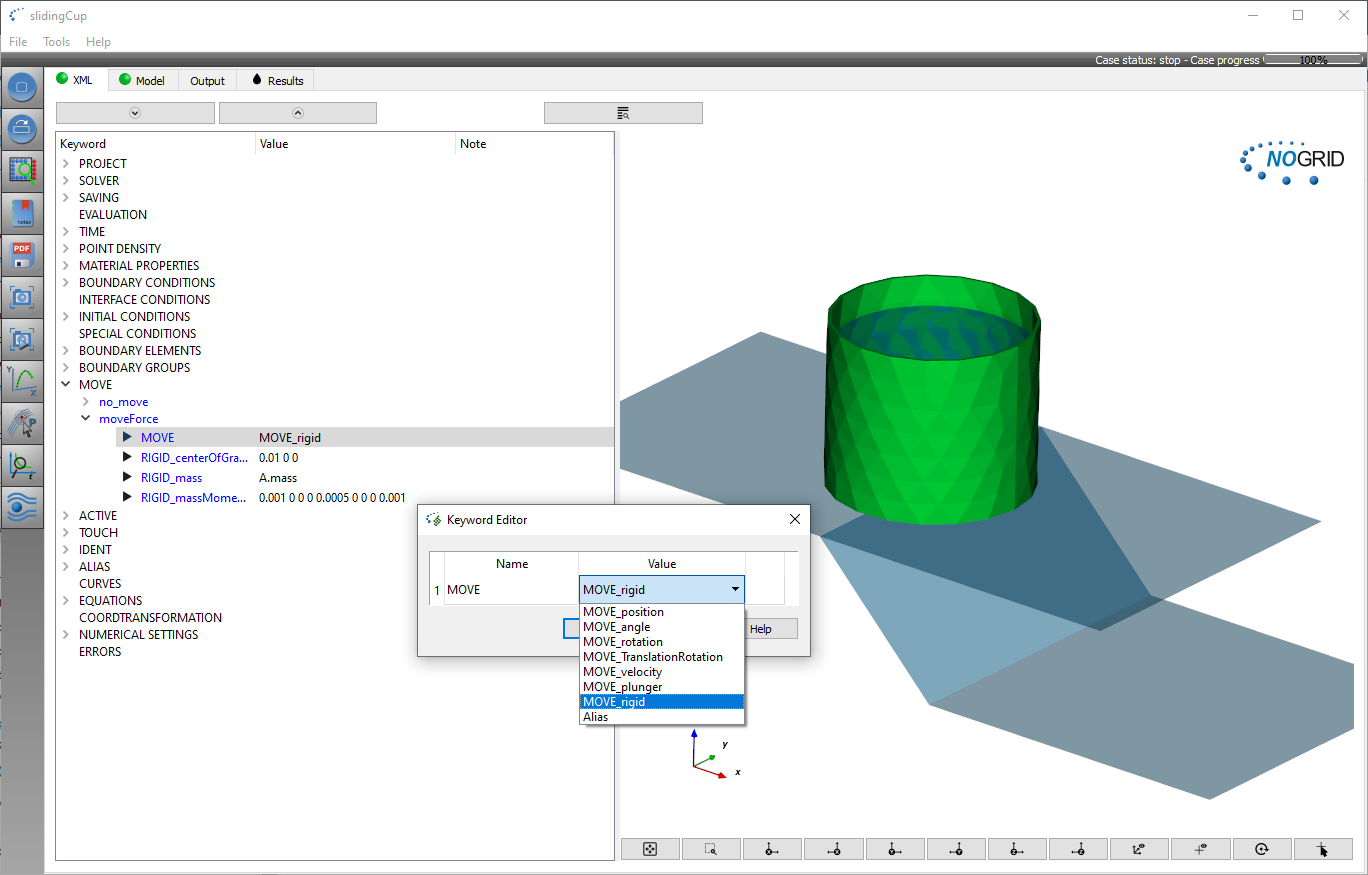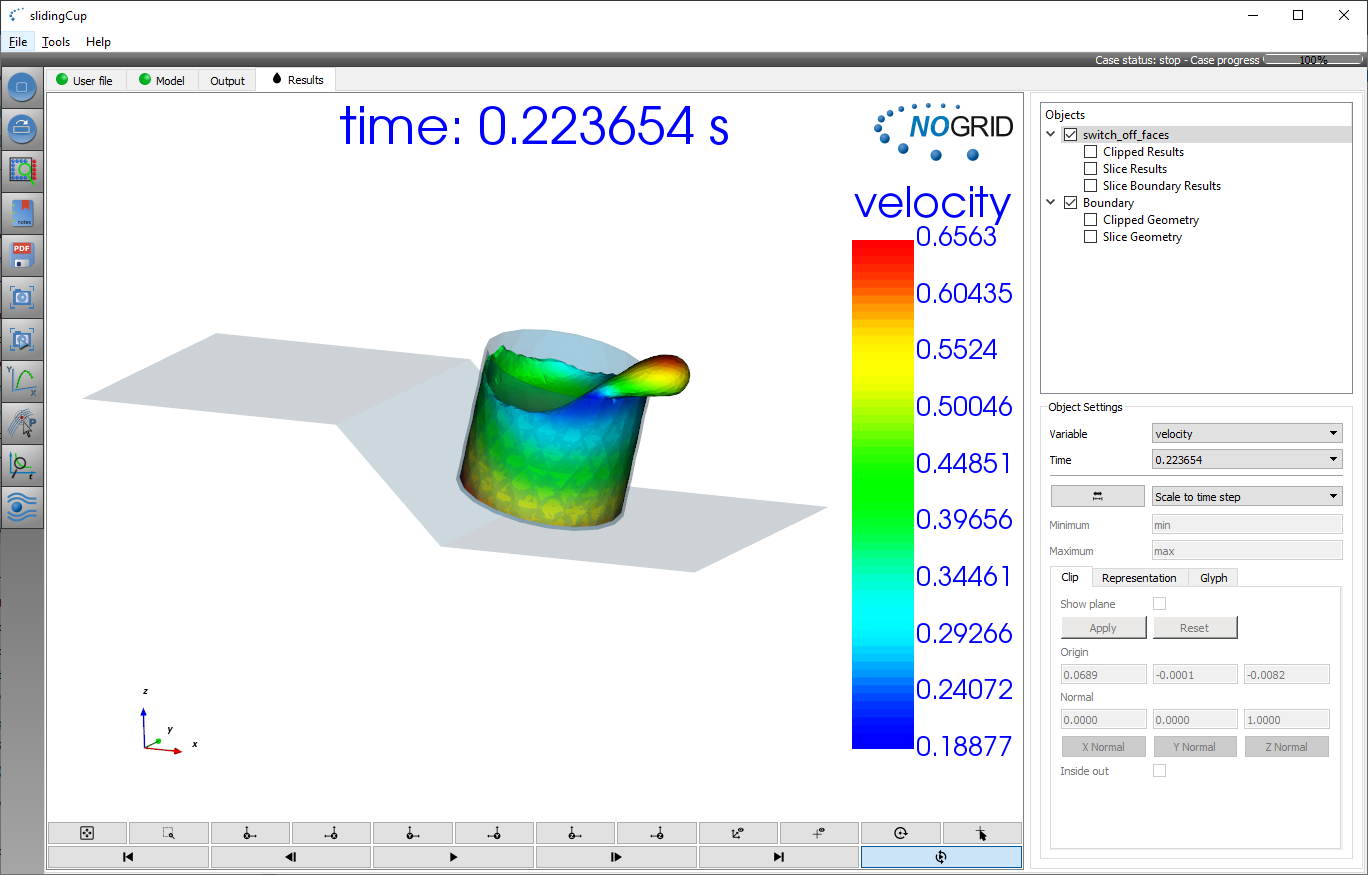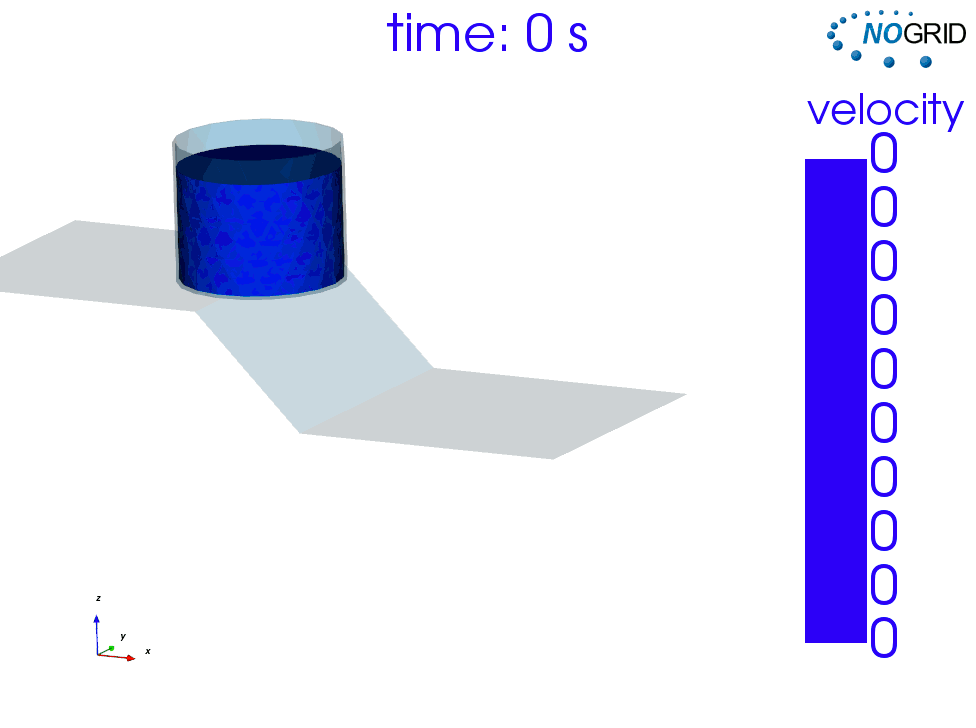Simulation Fluid-Structure Interaction 3D Sliding Cup
The simulation of a fluid-structure interaction of a sliding cup in 3D can be performed with NOGRID points CFD software.
In this fluid-structure coupling, the fluid is in a cup that slides down an inclined plane. No initial speed is imposed on the cup or fluid, but a bottom wall is turned off at a certain time, causing the cup and fluid to start rotating under their self weight. The cup slides down the inclined plane and is accelerated together with the fluid. The slip coefficient between the cup and the floor is assumed to be ideal here, i.e. there is no friction.
The fluid-rigid body interaction simulated in this study is solved fully coupled with the Lagrangian method. Fully coupled means that the movement (translation and rotation) of the cup (= the rigid body) and the fluid variables for velocity and pressure are solved simultaneously in a large solution matrix (no iterative switching back and forth between the solution variables necessary).
In engineering, this fluid-structure coupling (=FSI=Fluid-Structure-Interaction) refers to the consideration of the mutual influence of moving, not necessarily rigid bodies and a flow. The interaction between fluid flow and bodies occurs in many physical applications. The flow, in this case in a rigid body, causes both displacement and rotation of that body due to the forces and torques exerted on the body by the fluid. Conversely, the movement of the body causes changes in the flow. If the flow also changes due to the structure, there is a so-called real, two-sided fluid-rigid-body coupling. If several rigid bodies are involved, the movement of one body can of course also be influenced by collisions with other bodies.
As with any rigid body in the FS coupling, the cup in this simulation is assigned a weight and a mass moment of inertia. The rigid body thus behaves in accordance with the forces acting on it from the fluid. Conversely, of course, the flow is also influenced by the rigid bodies (see left "spilling over" of the fluid from the cup).
NOGRID points can perfectly be used for designing and problem solving for all kinds of FSI processes. NOGRID points helps to understand the flow by visualization of the mass, momentum and motion of single and multiple rigid bodies. You receive integral quantities which you can use to analyze the efficiency of components and processes.
NOGRID unites abilities to handle free surface flow and moving parts in the domain and allows the simulation of any conceivable geometry and operation modes such as
- computation is in full 3D solving complete Navier-Stokes-Equations
- easy and intuitive setup also for FSI (Fluid-Structure-Interaction) cases
- free definable material properties by equations or curves
- evaluation of chemical reactions and corresponding heat source terms
- open or closed domains including inflow and outflow areas (non-batch mode)
- moving of parts
Nogrid's strengths
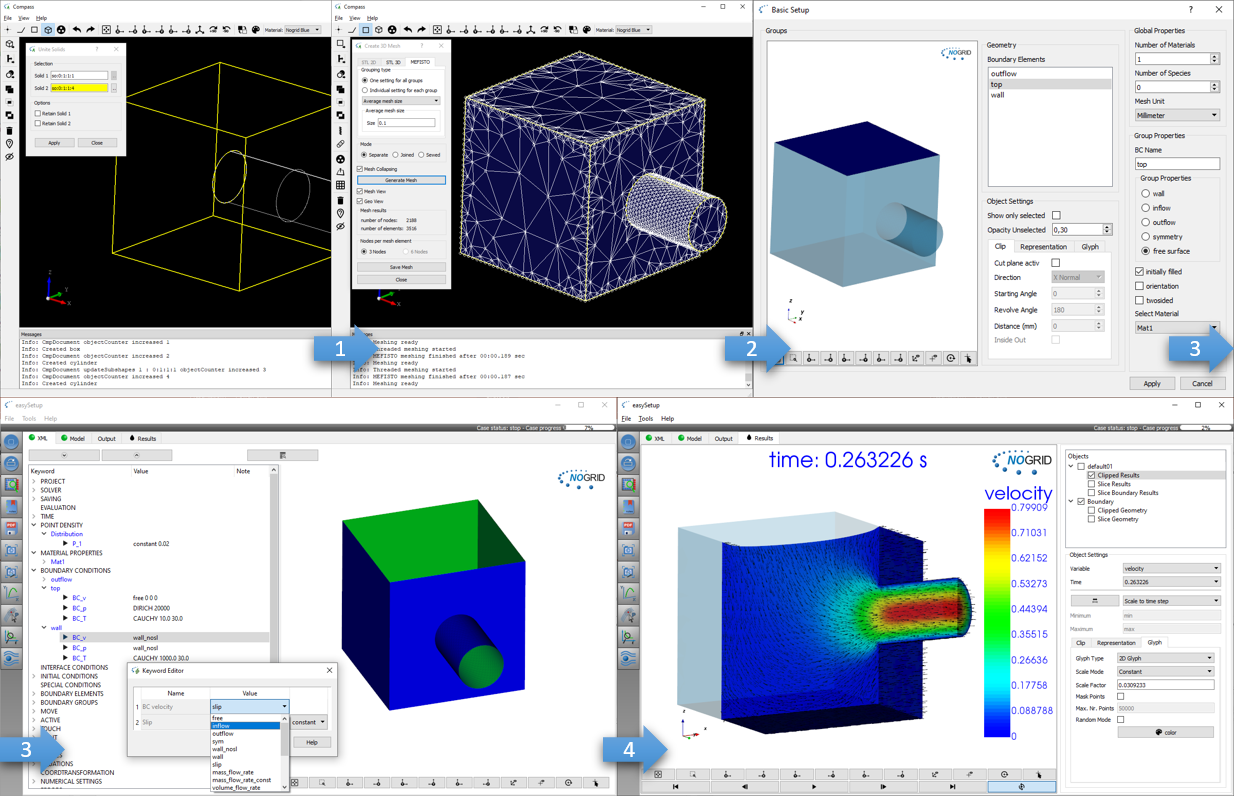
Easy and fast modelling: Build geometry, mesh boundary, setup the case and start computation
What is CFD from NOGRID?
CFD solves the fundamental equations that define the fluid flow process. With CFD software from NOGRID every engineer makes better decisions by predicting, analyzing and controlling fluid flow, heat and mass transfer or chemical reaction. By using NOGRID software for flow modeling you receive information on essential flow characteristics as for example flow distribution. Using it additional to testing and experimentation NOGRID software helps to improve the evaluation of your design – resulting in better construction and operation parameters, increasing planning security and money savings due to faster time to the marketplace for your product or process.
Choose NOGRID
With NOGRID, you choose professional CFD software and services – our aim is helping you to be successful. When you decide to work with NOGRID you choose close cooperation with a dynamic, flat hierarchies-organization. Short information channels result in quick and accurate professional support and service. Our team consists of highly qualified employees, who are experts in fields such as numerical simulation or computational fluid dynamics. Based on our know-how, we are pleased to offer the following services, responding to your individual requirements:
TRAINING
In our two-days training courses you will learn, how to use NOGRID CFD software efficiently. Our technical support team will teach you how to handle and solve different cases.
For more details please refer to Training Courses →
Technical Support
We offer full professional support from the minute you start using our software, by telephone or by email. Contact us, when ever needed.
For more details please refer to Software Support →
Service
Lack of time or resources and other constraints often make outsourcing an attractive solution. We help you with your flow modeling needs. Based on our engineering expertise in this field we offer individual numerical simulation services matching the unique needs of your organization.
For more details please refer to Simulation Services →

